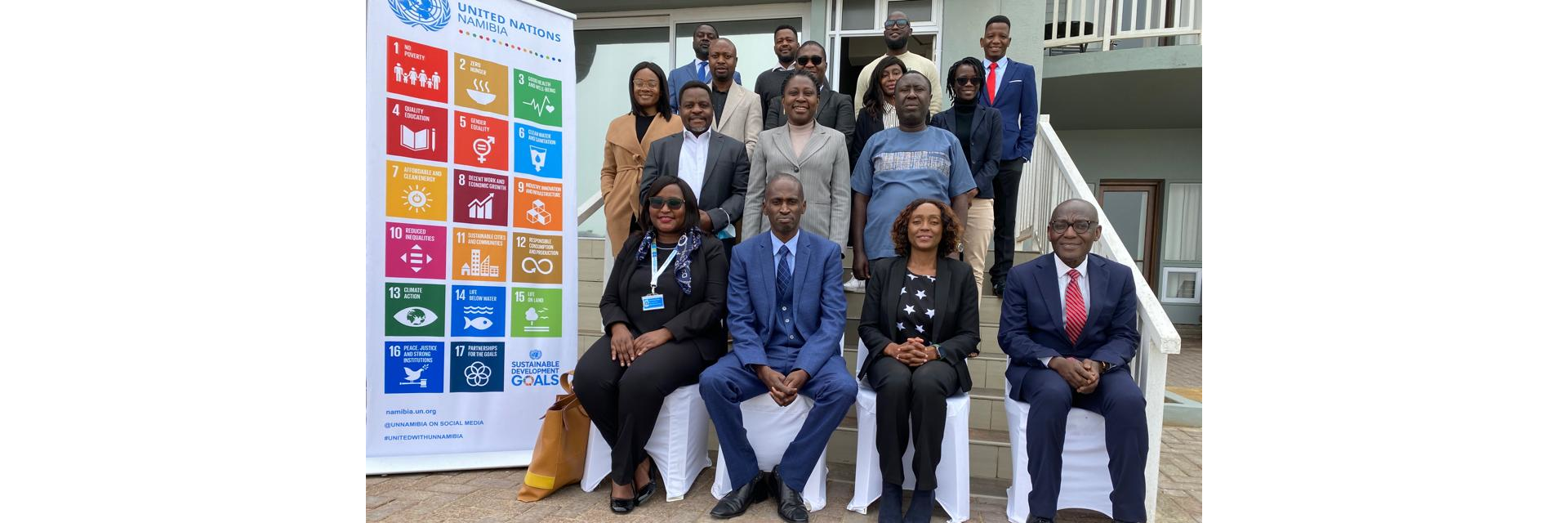Swakopmund, Namibia, 16 September 2022 (ECA) -The ECA collaborating with UN Namibia and the Government of the Republic of Namibia convened a workshop on Macroeconomic Modelling for Forecasting and Policy Simulation, towards Economic Transformation and the Acceleration of the SDGs in for Namibia on 13 – 16 September 2022, in Swakopmund Namibia.
Speaking on behalf of the Government, Mubusisi Mabuku, Deputy Chief National Development Advisor, Macroeconomic Planning at the National Planning Commission (NPC), in his Opening remarks expressed that Namibia’s long-term blueprint (Vision 2030 launched in 2004) articulates the country’s desire to become industrialised by 2030 with income on par with advanced economies. This was to be achieved through significant value addition/manufacturing especially from mineral resource endowments. However, structural transformation has not been in line with expectation as evidenced by the stagnant disaggregation of the industrial make-up between primary, secondary, and tertiary industries.
Inequality, poverty and unemployment remain high for an economy the size of Namibia, exacerbated further by the pandemic. Optimal policies informed by evidence remain crucial in ensuring the achievement of economic transformation. Modelling is essential in devising policies. As such Mr. Mabuku urged all participants to interrogate and devise implementable strategies to yield desired outcomes.
Joseph Atta-Mensah, Principal Policy Advisor in the Macroeconomics & Governance Division of the ECA, in his opening remarks thanked the government of Namibia for inviting ECA to train policymakers on the use of Macroeconomic models. He noted that Economic models are pertinent in assisting policymakers to make evidence-based decisions. At the advent of the COVID-19 pandemic, the ECA Macro-model was used to support policy dialogue between the leadership of ECA and African ministers on how to mitigate the effects of the pandemic, including through the Debt Service Suspension Initiative (DSSI) and the allocation of Special Drawing Rights ( SDRs).
Mr Atta-Mensa urged participants to use the training to acquire the tools to support their government to address economic challenges with appropriate policies. He thanked the UN Resident Coordinator and his staff for organizing the workshop.
UN Resident Coordinator in Namibia, Sen Pang, reminded participants that the macroeconomic model that was originally developed in 2020 was applied to simulate various scenarios to estimate the socio-economic impact of COVID-19. This helped to generate policy options and recommendations for long-term response and recovery, with the results of the simulation being incorporated into the Socio-Economic Impact Assessment of COVID-19 in Namibia (SEIAC-NAM), and ultimately the Socio-Economic Response Plan (SERP), as per the UN framework for the immediate socio-economic response to COVID-19.
Mr Pang said the socio-economic impacts of the Ukraine war need to be modelled to inform UN programming and support policy choices of the Government, including in the context of developing the Integrated National Financing Framework (INFF) for financing national sustainable development priorities and the SDGs at the country-level.
UN Namibia has commenced work on the Common Country Assessment (CCA) to establish an integrated, forward-looking, and evidence-based analysis of the country’s context for sustainable development. The CCA will feed into the country’s United Nations Sustainable Development Cooperation Framework (UNSDCF) 2024 – 2028 to support the implementation of the 2030 Agenda for Sustainable Development.
The workshop achieved its objectives of updating Namibia’s Macroeconomic Model and transferring skills through practical training on its theoretical underpinnings, practical development and utilization. The model will be applied to generate policy options for economic transformation, social development and exclusion, and financing development. Plans are underway for the model to be finalized and absorbed by the Government with technical assistance from the UN system.
The macroeconomic modelling initiative at ECA is being coordinated by Hopestone Chavula, Economic Affairs Officer, and Professor Ferdinand Ahiakpor, Vice Dean, School of Economics, Department of Data Science and Economic Policy, University of Cape Coast. Participants at the hybrid workshop included representatives from the Bank of Namibia (BON), Ministry of Finance (MoF), the National Planning Commission (NPC), Namibia Statistics Agency (NSA), African Development Bank (AfDB), with sector-specific contributions including on labor, health, agriculture, and health from the United Nations System (FAO, ILO, UNICEF, UNDP, UNFPA, UNDESA, WHO).
For additional information, please contact:
-
Mr. Hopestone Chavula, Senior Economist, ECA (chavula@uneca.org)
-
Mr. Jecob Nyamadzawo, Social Policy Manager, P4C, UNICEF Namibia (jnyamadzawo@unicef.org)
-
Ms. Eunice Ajambo, Economist, UN Namibia (ajambo@un.org)
Issued by:
Communications Section
Economic Commission for Africa
PO Box 3001
Addis Ababa
Ethiopia
Tel: +251 11 551 5826
E-mail: eca-info@un.org

